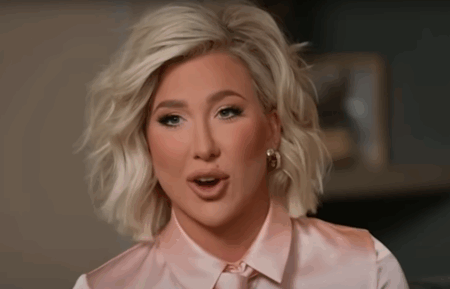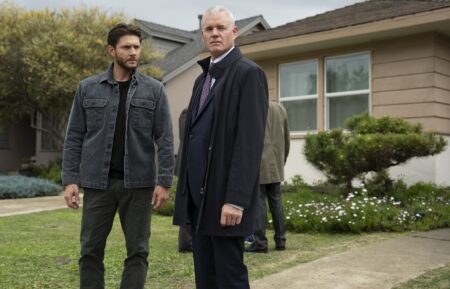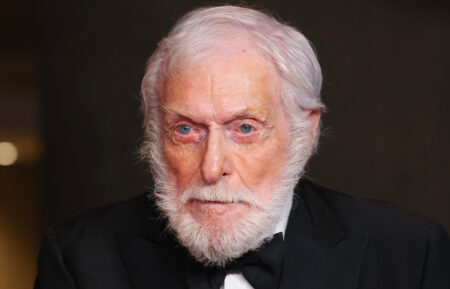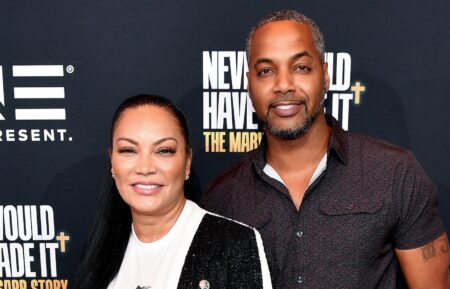‘Goliath’ Boss Jonathan Shapiro on the Legal Potboiler’s Twists and Turns
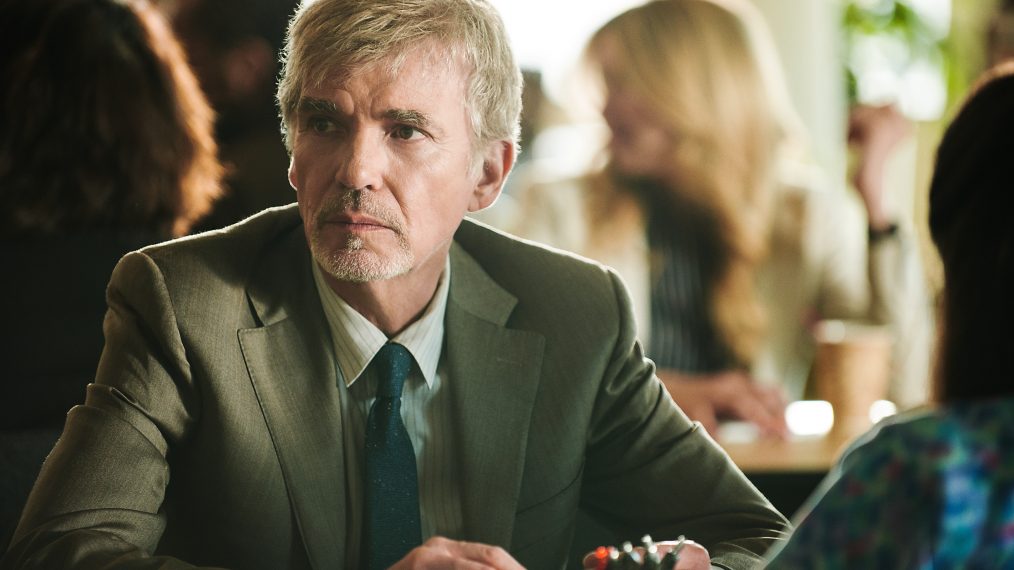
If you’ve been watching Amazon’s thriller Goliath since it started streaming on the service on October 14, you know it’s not your average legal show. It stars Billy Bob Thornton as Billy McBride, a lawyer who has fallen on hard times and is trying to make a comeback by taking a wrongful death case being defended by his the massive firm he co-founded with his partner, Donald Cooperman (William Hurt). The ending of Episode 2 alone should have told viewers that this isn’t anything like the show’s creators, David E. Kelley and Jonathan Shapiro, have done before.
Shapiro, a lawyer who turned to television writing in 2000 in Kelley’s The Practice, has also written and produced for shows like Life, Boston Legal and The Blacklist. He sat down with TV Insider to talk about the show, why Hurt’s character is more than just Blofeld-level evil and why he and Kelley may never write for broadcast networks again.
RELATED: Goliath‘s Molly Parker on Playing a Woman Who “Eats Life”
Did David Kelley come to you with the idea for the show or the other way around?
David’s idea to try to do something that we had talked about in 2000 which was a really hard look at how a single trial affects everybody involved, a case based on cases I had worked on when I was at the U.S. Attorney’s Office. I was writing on The Blacklist but I had decided to become a council at Kirkland and Ellis and go back to practicing law; I’d done political asylum cases since I started writing for TV but I hadn’t gone back to a law firm.
When David called me in 2015 at that point I had actually been working at one of these large massive global law firms. I said to David, “You know, it’s funny law has changed so much since when I graduated law school. I don’t really see any shows doing the kind of cases in the kind of world that I’m seeing here.” Again, the evil law firm is not based on Kirkland and Ellis, which is a paragon of virtue and a wonderful organization.
Is the difference though that the law firm is this big global concern now that is run like a massive corporation?
When I graduated law school in 1990 from Berkeley we were still wrestling with the idea was it moral or ethical for a lawyer to advertise, right? Now we have over 20 law firms in the United States with revenues of over one billion dollars with a B. They are tied through stock options and through the economic involvement of the lawyers in the economic well being of the corporations they work for.
The question then become are they giving advise based on what’s ethical and what’s legal or are they giving advice based on their own financial interest and how can you tell the difference? The last few economic disasters in our country made off being one exception all involved large financial institutions that had huge lawyer entities advising them. That’s worrying. There are [also] the issues like the fact that when I walked into the law firm again it was paperless. Unheard of. Nobody goes to the law library. Nobody does that kind of research anymore. Discovery used to take maybe two years because of the number of documents, with algorithm search engines can be done in two weeks. Individual lawyers don’t have those programs. They don’t have that kind of money to fight that kind of war.
Is the idea to show how tough it is as a solo lawyer to fight that big huge corporate firm?
Yeah. I mean, David versus Goliath has always been the case right? People don’t like to remember that Abe Lincoln when he was a lawyer represented the railroads against little guys, right? The point is that there’s always been the individual plaintiff and the hard fight that he or she has going up against the big corporation. That’s American history.
What’s changed in the last 20, 30 years is just the size of the Goliath and it’s connectedness to corporate power, their ability to make it harder by law for the plaintiff to get into court. Since I became a lawyer the number of jury trials in most metropolitan areas and civil cases had gone down 40 to 60%. The fact that less than 1% of all federal cases even get in front of a jury that worries us.
David Kelley and I think is a bad thing because we’re old people and when we graduated law school we thought that being a trial lawyer was an important civil responsibility because James Madison said in the Federalist Papers that the jury system was the most important check on the potential abuses in a democracy. Yet we’re living in a time where legislatures are passing laws making it harder to get into court. The number of jury trials are going down. The costs are going up.
RELATED: Goliath: Billy Bob Thornton and David E. Kelley Team for Legal Thriller on Amazon
The first two episodes that I saw were basically a lot of procedural stuff. What’s the challenge in taking that and making it into something that’s dramatic and will hold an audience?
Well, it’s a great question and I’ll tell you what we talked about the first time we talked about the case. David and I both love the streaming shows, Netflix and Hulu. We loved The People vs. OJ. We loved Making a Murderer. Yet, we thought, “You know, the vast majority of American’s lives will be impacted by civil law. Not by criminal law.” Criminal law … Lord knows we get enough of those cases on all the law shows we wrote on. It’s very dramatic about one person or about a small group of people. Civil law, that affects … That’s Brown vs. Board of Education. That’s changing the country.
The challenge is how do you make a case in civil court as compelling as a criminal case? I think we achieved it by picking a case that’s about something that affects all of us which is how does living in a country that’s always at war affect the legal system. It’s a civil case but about something that affects all of us which is what are the moral implications and what are the legal implications of being a country at perpetual war. The reason why we picked this is because Kelley and I both thought, “You know, I don’t really see any shows talking about that. I don’t see any shows dealing with civil law.” Yet, issues of morality and of justice and of life and death get played out in civil law in a way that affects more people more than they ever do in criminal cases.
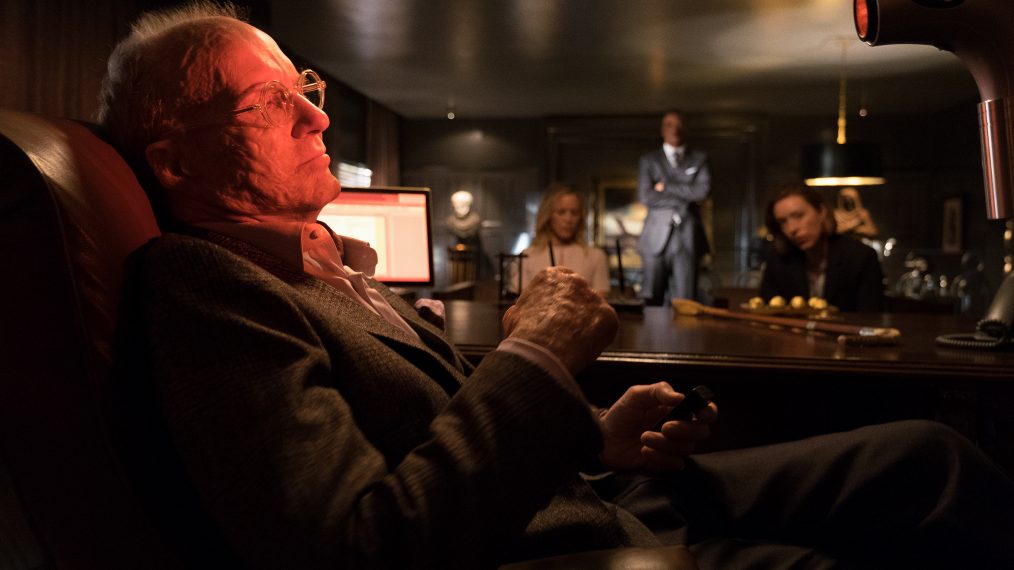
William Hurt plays Donald Cooperman, former partner of Billy McBride (Thornton).
Obviously the most intriguing one of all is William Hurt’s character of Donald Cooperman because he’s got all these interesting little quirks. Did you have to approach things a little bit differently than you did on network TV? Or did you guys just sit down and say, “What kind of characters can we attach to this backbone of the civil case?”
At least for us it works more from the inside out. It’s a sad thing how any times I’d be in court and the lawyer on the other side had alcohol on his breath, right? The American Bar Association and the Betty Ford Clinic just but out a study this year that showed that attorneys have, I think, three times higher level of substance abuse than other professions and mental health issues.
We started with the fact that in our careers as lawyers we saw the damage done to individuals through the adversarial system. If you spend your life fighting with people it actually affects you. If you spend your life trying to square the ethical circles created by acting more like a corporation than like a lawyer it takes a toll. We wanted to explore that because we’ve suffered from it. I mean, I’ve suffered from it. I’ve seen the toll it takes to be engaged in this sort of natural disaster that is a trial. We wanted to show how it affects everybody who gets sucked into it. From the lawyers to the parties to the witnesses who just happened to be pulled into it, into this vortex. That’s the passion that brought is to this. And showing people what we think is real about law in the 21st century that isn’t being talked about. What we think is real about our country that isn’t being talked about.
But the way Hurt’s character is portrayed, I almost expect him to be petting a cat like Blofeld. He’s got the burn on his face. He can’t see colors. Everything’s dark. He clicks the clicker. How do you get to that?
Clark Clifford, who was a great attorney in Washington D.C., one of the grand old men of the legal profession, because of his war service was incredibly light sensitive and had to work in a dark office like that. Now people think Clark Clifford was a hero because of his service to Harry Truman and Lyndon Johnson. Some people thought he was a war criminal because his work as an advisor to Johnson on Vietnam. There was a great journalist named Robert Timberg who was horribly facially scarred because of his service in Vietnam. I think he was a complete hero but in his book Fortunate Son he talked about how people judged him unfairly because of his facial scar.
William Hurt’s character isn’t either of those guys but there are elements of many many lawyers and many many people in Hurt’s character. In the first two episodes if you think he’s Blofeld that’s fine. Because I think I hope by the end you won’t think of him in that way. You’ll think of him as possibly the hero of the piece. I hope and in fact I’m quite sure that as you see more episodes you’ll start to question whether Billy is the hero of the piece or the villain.
The end of the second episode has a shocking twist. Do you feel that you can do more of that for Amazon as opposed to a broadcast network? Because it’s a continuing story, because it can be a little more daring?
Ironically with all the technology we’re just getting back to what used to be storytelling. Where Dickens would write a serialized novel that would go on and every chapter of David Copperfield makes it impossible not to read the next chapter. I mean, that to me is just good storytelling. As a matter of fact, what I think is artificial and the reason why I don’t think David and I can ever go back to the network is trying to shoehorn a compelling story into the seven or eight-minute chunks that you have between the commercials and then trying to keep the audience engaged through that pod of commercials. Then trying to hook them to come back next week.
It was an interesting skill to have and it was a good skill to have and I admire people who can do it. It’s not quite as freeing as old fashioned storytelling. Our job is to keep people watching and to keep people reading. The goal is to get them to hit the button to see the next one. I don’t think it’s required that you have a twist of the level of the end of Episode 2. I think you can have emotional through-lines that keep people watching once they’re invested in the characters.
What does Billy Bob bring to the table that helps you?
Well, we didn’t have anybody in mind when we wrote the character and then he read it and agreed to do it. Frankly we could never imagine anybody else. What he brings to it is a living breathing character that’s better than anything we could have imagined. Because he’s Billy Bob Thornton and he brings this wicked nativist intelligence with an extraordinary level of charm and a loosely leashed insanity. You just can’t take your eyes off him. I mean, to find a guy who is smart and who can credibly play a brilliant lawyer and also a drunk who’s slowly destroying himself I mean, Billy Bob’s the best.
What would a second season of the show look like? Would it be Billy Bob taking on a different case?
We have a case and it’ll be another season of that case with the ongoing story lines of the repercussions of what happens at the end of the first season. The repercussions both on Billy but also on the other characters. Because you know when a trial ends in real life the impact on the people continues. Just ask Marcia Clark.
Goliath, available now, Amazon Prime Video.
From TV Guide Magazine
How 'Countdown' Recruited Jensen Ackles to Go Full 'Die Hard'
Countdown boss Derek Haas talks creating the character around Ackles, and the cast teases the “Avengers”-like team of the crime thriller. Read the story now on TV Insider.




